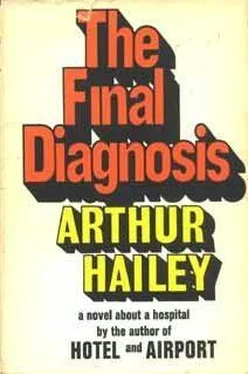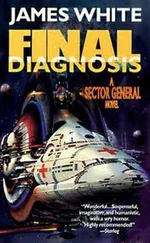Arthur Hailey - The Final Diagnosis
Здесь есть возможность читать онлайн «Arthur Hailey - The Final Diagnosis» весь текст электронной книги совершенно бесплатно (целиком полную версию без сокращений). В некоторых случаях можно слушать аудио, скачать через торрент в формате fb2 и присутствует краткое содержание. Жанр: Триллер, на английском языке. Описание произведения, (предисловие) а так же отзывы посетителей доступны на портале библиотеки ЛибКат.
- Название:The Final Diagnosis
- Автор:
- Жанр:
- Год:неизвестен
- ISBN:нет данных
- Рейтинг книги:4 / 5. Голосов: 1
-
Избранное:Добавить в избранное
- Отзывы:
-
Ваша оценка:
- 80
- 1
- 2
- 3
- 4
- 5
The Final Diagnosis: краткое содержание, описание и аннотация
Предлагаем к чтению аннотацию, описание, краткое содержание или предисловие (зависит от того, что написал сам автор книги «The Final Diagnosis»). Если вы не нашли необходимую информацию о книге — напишите в комментариях, мы постараемся отыскать её.
The Final Diagnosis — читать онлайн бесплатно полную книгу (весь текст) целиком
Ниже представлен текст книги, разбитый по страницам. Система сохранения места последней прочитанной страницы, позволяет с удобством читать онлайн бесплатно книгу «The Final Diagnosis», без необходимости каждый раз заново искать на чём Вы остановились. Поставьте закладку, и сможете в любой момент перейти на страницу, на которой закончили чтение.
Интервал:
Закладка:
“Let me be the judge of that. Give me a few days and we’ll be caught up in surgicals.”
It was obvious that Joe Pearson had no intention of giving way. O’Donnell had expected resistance to bringing in a new pathologist, but he wondered about the other man’s forcefulness. Was it because he was unwilling to divide his personal empire, or was he simply protecting his job—fearful that a new and younger man might undermine him? Actually the idea of removing Pearson had not occurred to O’Donnell. In the field of pathological anatomy alone Joe Pearson’s long experience would be hard to replace. O’Donnell’s objective was to strengthen the department and thereby the hospital organization. Perhaps he should make this clear.
“Joe, there’s no question of any major change. No one has suggested it. You’d still be in charge . . .”
“In that case let me run Pathology my own way.”
O’Donnell found his patience ebbing. He decided that perhaps he had pressed the point enough for now. He would let it go for a day or two, then try again. He wanted to avoid a showdown if he could. He said quietly, “I’d think it over if I were you.”
“There’s nothing to think over.” Pearson was at the door. He nodded curtly and went out.
So there it is, O’Donnell thought. We’ve laid the lines of battle. He stood there, considering thoughtfully what the next move should be.
Five
The cafeteria of Three Counties Hospital was a traditional meeting place for most of the hospital grapevine, its stems and branches extending tenuously to every section and department within Three Counties’ walls. Few events occurred in the hospital—promotions, scandals, firings, and hirings—which were not known and discussed in the cafeteria long before official word was ever published.
Medical staff frequently used the cafeteria for “curbstone consultations” with colleagues whom they seldom saw except at a meal or coffee break. Indeed, a good deal of serious medical business was transacted over its tables, and weighty specialist opinions, which at other times would be followed by a substantial bill, were often tossed out freely, sometimes to the great advantage of a patient who, recovering later from some ailment which at first had proven troublesome, would never suspect the somewhat casual channels through which his eventual course of treatment had come.
There were exceptions. A few staff physicians now and then resented this informal use of their arduously acquired talйnts and resisted attempts by colleagues to draw them out in the discussion of specific cases. In such instances the usual rejoinder was, “I think we’d better set up a consultation in my office. I’ll have the meter running then.”
Gil Bartlett was one who disapproved of such approaches and at times could be a good deal blunter in refusing off-the-cuff opinions. One story told about his personal tactics of resistance had its origin not in the cafeteria but at a cocktail party in a private home. His hostess, a grand dame of Burlington society, had buttonholed Bartlett and bombarded him with questions about her illnesses, real and imagined. Bartlett had listened for a while, then announced in a loud voice which brought a hush to the crowded room, “Madam, I believe from what you say you have a menstrual problem. If you’ll strip right now I’ll examine you here.”
Mostly though, much as they might resist informal consultations outside the hospital, the medical staff accepted the cafeteria exchanges on the basis that they had as much to gain as lose; and a good many physicians around the hospital used the mildewed quip on leaving their contact points, “If you want me I’ll be in my second office.” Normally no further explanation was required or given.
Generally the cafeteria was a democratic area where hospital rank, if not forgotten, was at least temporarily ignored. An exception, possibly, was the practice of setting aside a group of tables for the medical staff. Mrs. Straughan, the chief dietitian, hovered over this area periodically, knowing that even minor shortcomings in hygiene or service could bring testy complaints at some future meeting of the hospital’s medical board.
With few exceptions the senior attending physicians used the reserved tables. House staff, however, were less consistent, residents and interns sometimes asserting their independence by joining the nurses or other groups. There was nothing unusual, therefore, in Mike Seddons dropping into a chair opposite Vivian Loburton who, released from an assignment earlier than some of her fellow student nurses, was eating lunch alone.
Since they had met ten days ago in the autopsy room, Vivian had encountered Mike Seddons several times in the hospital and on each occasion—seeing his thatch of red hair and wall-to-wall grin—she had increasingly come to like the look of him. Intuitively she had expected that soon he might make a direct approach to her, and now here it was.
“Hi!” Seddons said.
“Hullo.” The greeting came out awkwardly, Vivian having just bitten, with healthy appetite, into a chicken leg. She pointed to her mouth and mumbled, “Excuse me.”
“That’s perfectly all right,” Seddons said. “Take your time. I’m here to proposition you.”
She finished the mouthful of chicken, then said, “I thought that was supposed to come later.”
Mike Seddons grinned. “Haven’t you heard?—this is the jet age. No time for formal frills. Here’s my proposition: theater the day after tomorrow, preceded by dinner at the Cuban Grill.”
Vivian asked curiously, “Can you afford it?” Among house staff and student nurses poverty was a time-honored, rueful joke.
Seddons lowered his voice to a stage whisper. “Don’t tell a soul, but I’m on to a side line. Those patients we get in autopsy. A lot of ’em have gold fillings in their teeth. It’s a very simple matter . . .”
“Oh, shut up; you’ll ruin my lunch.” She bit the chicken leg again, and Seddons reached over for two of her trench fries.
He savored them. “Um, not bad. I must eat more often. Now here’s the story.” He produced two tickets from his pocket and a printed voucher. “Take a look at this—compliments of a grateful patient.” The tickets were for the road show of a Broadway musical. The voucher covered dinner for two at the Cuban Grill.
“What did you do?” Vivian was frankly curious. “Heart surgery?”
“No. Last week I filled in for half an hour for Frank Worth in emergency. A guy had a bad gash on his hand and I stitched it. Next thing I knew, these were in the mail.” He chuckled. “Worth is furious, of course. Says he’ll never leave his post again. Well, will you come?”
“I’d love to,” Vivian said, and meant it.
“Great! I’ll pick you up at the nurses’ residence at seven o’clock. Okay?” As he spoke Mike Seddons found himself regarding this girl with even greater interest. He was suddenly aware that she had a good deal more than a pretty face and a good figure. When she looked at him and smiled it conveyed the feeling of something warm and fragrant. He thought: I wish we were meeting today instead of the day after tomorrow; it’s a long time to wait. Then a faint warning voice inside him cautioned: Beware entanglements! Remember the Seddons policy: love ’em and leave ’em—happy with their memories; parting is such sweet sorrow but, oh, so very practical for staying unattached.
“Okay,” Vivian said. “I might be a little late but not much.”
A week and a half had passed since Harry Tomaselli had told O’Donnell that construction of the hospital’s extension was planned to begin in the spring. Now, in the administrator’s office, he, Kent O’Donnell, and Orden Brown, the board chairman, were meeting to discuss immediate things to be done.
Читать дальшеИнтервал:
Закладка:
Похожие книги на «The Final Diagnosis»
Представляем Вашему вниманию похожие книги на «The Final Diagnosis» списком для выбора. Мы отобрали схожую по названию и смыслу литературу в надежде предоставить читателям больше вариантов отыскать новые, интересные, ещё непрочитанные произведения.
Обсуждение, отзывы о книге «The Final Diagnosis» и просто собственные мнения читателей. Оставьте ваши комментарии, напишите, что Вы думаете о произведении, его смысле или главных героях. Укажите что конкретно понравилось, а что нет, и почему Вы так считаете.












